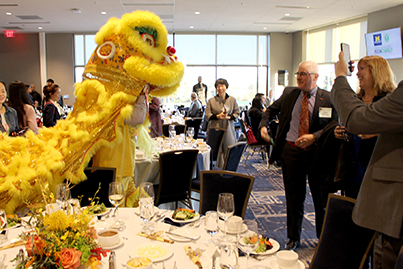This year’s Joint Institute (JI) Symposium brought PKUHSC faculty in disciplines from cardiology and liver disease to mental health and big data. The three-day meeting took place Oct. 15-17 across the U-M medical campus and included sessions on cancer research, medical education, addiction, dental health, and more, as well as time for individual collaborators to advance dozens of ongoing JI projects. The JI is the medical school’s largest single international partnership.

“Our ability to reach out beyond our own institutions – and beyond our own borders – is vitally important. As our world gets smaller, the inverse is true of our problems. They get bigger and more complex,” said U-M President Mark Schlissel in his welcome address to open the meeting. “Together, we understand that global challenges demand collaborations that bring together some of the best minds in the world to think big and tackle problems that transcend language, culture and politics.”
Launched 2010, the JI is co-funded by Michigan Medicine and PKUHSC and offers seed grants to teams of investigators between the institutions to collaborate on mutually beneficial projects in a variety of disciplines. Since its inception, the JI has funded nearly 50 projects in cardiology, nephrology, pulmonary care, fertility, and more, research that has garnered 60-plus high-impact publications and more than $14 million in external funding to date.
Recent expansions have included more projects in areas such as emergency medicine, psychiatry and mental health, precision medicine, and medical education. There were ten new awards this year, the largest cohort yet. A recently established JI Leadership & Development Council, headed by Michigan Medicine Victors campaign chair Richard Rogel and Beijing hospital owner Lana Hu, is also poised to grow the collaboration.
“It’s gratifying to think about how far we’ve come. In eight short years, the JI has become a model for how institutions can sustain meaningful collaborations through common goals, shared values, and mutual respect,” said JI co-director Joseph Kolars, UMMS Senior Associate Dean for Education and Global Initiatives, who helped launch the partnership shortly after joining Michigan Medicine. “I’m grateful to my colleagues at PKUHSC and to the dedicated faculty on both sides who continue to advance this important partnership.”
While PKUHSC has many partnerships abroad, the relationship with Michigan Medicine is the longest-running and largest. Thanks in large part to the success of the JI, PKUHSC was recently recognized by the Chinese government with a National Key Center designation for international research collaborations, an honor that elevates the partnership’s status across China and could result in increased funding opportunities for participating researchers.
Kolars co-directs the JI with PKUHSC Vice President Ning Zhang, PhD. Zhang, a Johns Hopkins-trained molecular biologist, who recently joined the faculty at PKUHSC. This year’s JI Symposium marked Zhang’s first.
“I am very enthusiastic about the research programs I’ve seen here (at UMMS) and excited about the JI partnership. While we have many international partnerships, the JI is our top priority,” he said. “We’ve never organized a program like it with any school before. Our leadership is engaged. More important, our faculty are very excited about this collaboration.”
